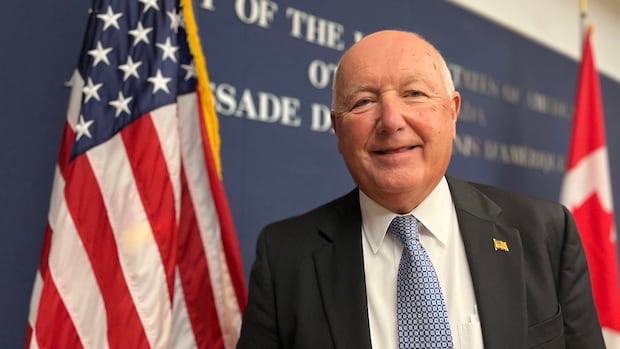The new U.S. ambassador to Canada says he knows the implication of King Charles III’s upcoming trip to Ottawa is to push back on U.S. President Donald Trump’s 51st state threats — and he says there are “easier ways to send messages” to the American government.
“We’re thrilled that the king will be here,” said U.S. ambassador to Canada, Pete Hoekstra, in an interview with CBC’s The House that will air Saturday. “If there’s a message in there, there’s easier ways to send messages. Just give me a call. [Mark] Carney can call the president at any time.”
Hoekstra added that the annexation saga is “over.”
“Move on. If the Canadians want to keep talking about it — that’s their business. I’m not talking about it; Donald Trump is not talking about it. We’ve got too much on our plate to move forward because we’re all about increasing America’s prosperity, safety and security.”
On Tuesday, King Charles will deliver the speech from the throne in the Senate. Every new session of Parliament is opened by a throne speech, which lays out the government’s expected goals and how it plans to achieve them.
The King’s visit will mark the third time a British and Canadian monarch has read the speech from the throne in Canada, with Queen Elizabeth ll having delivered the speech in 1957 and 1977.
Hoekstra said the U.S. government will be listening closely to “the content of the speech because it is the platform of the ruling party.” King Charles will deliver the speech at about 11 a.m. ET and it’s expected to take between 20 and 25 minutes.
The U.S. ambassador also said “if there’s going to be any discussion about the 51st state, it’s going to be happening at the Donald Trump-Carney level, not at ambassadorial level, which tells me it’s done.”
Canada-U.S. tariff talks
Hoekstra said his understanding is that trade and tariff negotiations are underway between Canada and the United States, but he doesn’t know how intense they are at this point.
Prime Minister Mark Carney visited Trump in the Oval Office earlier this month and discussed the economic and security relationship with the U.S. president, but the Canadians have insisted any deal must include the U.S. lifting its tariffs.
Hoekstra said after the Carney-Trump summit, the U.S. president called on the Canadians to send a proposal about the tariffs.
During a news conference in Washington following his meeting with U.S. President Donald Trump, Prime Minister Mark Carney said he is making the case for tariffs to be removed and that ‘considerable efforts’ have been made to increase border security, specifically regarding fentanyl. Carney added there is ‘more work to do’ in making the case that tariffs aren’t good for Americans either.
“We’re waiting, I think, and believing that the ball is in Canada’s court to outline what they would like to do, maybe some proposals and those types of things,” the U.S. ambassador added.
Other countries around the world affected by U.S. tariffs have sent their own ideas to the Trump administration, which is pushing to get deals done and has no time for a drawn-out negotiation process, he said.
On Wednesday, Carney said in French the U.S. is an economic threat to Canada — which Hoekstra pushed back on during his interview.
“My opinion of that would be a little bit different,” Hoekstra said. “The United States of America is a huge economic opportunity for Canada. It already is. You’re our second-largest trading partner.”
Overall, Hoekstra said the United States is no longer going to support other countries at the expense of the American people.
“We are going to be negotiating in the best interest of America and the American people.
“We expect other countries to do the same thing in negotiations, and that actually will give us the best kind of agreements.”

